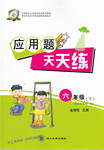题目内容
【题目】听下面一段较长对话,回答以下小题。
【1】When did the man buy the T-shirt?
A. Yesterday.B. A couple of days ago.C. A few weeks ago
【2】Why does the man want to change the T-shirt?
A. He wants a bigger size.B. He doesn't like the style.C. He prefers another color.
【3】What will the woman do next?
A. Change the T-shirt for the man.
B. Have a word with her manager
C. Give the man's money back.
【答案】
【1】C
【2】C
【3】B
【解析】
【原文】
此题为听力题,解析略。
【1详解】
此题为听力题,解析略。
【2详解】
此题为听力题,解析略。
【3详解】
此题为听力题,解析略。

练习册系列答案
 应用题天天练四川大学出版社系列答案
应用题天天练四川大学出版社系列答案
相关题目